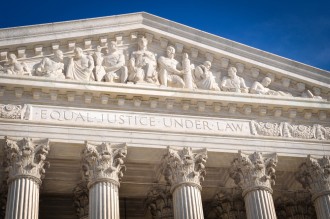
April 4, 2019
Startup Golf Entertainment Center’s Antitrust Claims Whiff Three Times Against Topgolf; But Will it Re-Tee?
On March 18, 2019, the United States Supreme Court left open another round of litigation in denying review of a Fifth Circuit ruling that dismissed SureShot’s antitrust case against Topgolf, that latter of which bought a company that licensed golf ball tracking technology to the former.
Founded in 2000, Topgolf operates golf entertainment centers around the world that pair a high-tech outdoor driving range with food, beverages and other entertainment amenities. Armed with patented technology, Topgolf can track a player’s golf ball and accurately score each shot based on distance and accuracy.
On the other end of the green, SureShot was formed in 2014 in a bid to unseat Topgolf from the leaderboard by offering a unique golf experience using high-speed cameras and software to track golf balls in flight. In April 2015, SureShot licensed a ball-tracking technology and related services from Protracer for an initial term of five years (expiring in 2020).
Shortly thereafter, Topgolf acquired Protracer.
In 2017, SureShot filed suit against Topgolf alleging various antitrust violations under the Sherman Act and the Clayton Act. Among SureShot’s allegations were that Topgolf acquired the Protracer technology that was essential to its business and refused to provide assurances that the technology would be available after the expiration of the initial five-year license. Topgolf moved to dismiss SureShot’s claims on grounds that they were not ripe and that SureShot failed to plead anticompetitive or exclusionary conduct as well as a relevant market. Topgolf argued that SureShot has not suffered any harm because Topgolf has honored the terms of the Protracer license and that SureShot’s antitrust theory was based solely on a prediction that Topgolf may someday decline to renew the Protracer service contract.
The United States District Court for the Southern District of Texas dismissed the case for lack of standing, finding that SureShot’s “perceived threats of monopolistic behavior are speculative” and “that none of the antitrust actions which SureShot alleges has actually occurred.” Stating that the antitrust laws were enacted for the protection of competition and not competitors, the District Court found that SureShot “failed to plead that Topgolf’s actions harmed competition overall, and not just SureShot’s competitive advantage.” The Fifth Circuit affirmed-in-part, stating that SureShot’s claims were not ripe for review because SureShot’s “complaint [is] ambiguous about the nature and immediacy of [its] injury” and “reads in hypotheticals and future threatened injury.”
In appealing to the Supreme Court, SureShot argued that as a result of Topgolf’s acquisition of Protracer, “existing and new market competitors, and there are none now that SureShot has folded, must develop new technology which may be difficult or impossible considering the market realities.” The Supreme Court leaves the Fifth Circuit’s dismissal without prejudice as it lies. Thus, SureShot could refile its claims.
Although this case was dismissed at the pleading stage, it brings to the fore the interplay between United States patent law, which expressly allows a monopoly, and United States antitrust law, which forbids certain monopolistic acts. Some courts have previously found that the acquisition of one or two dominating patents does not constitute a violation of the antitrust laws. And courts have also held that when a patent is lawfully acquired, subsequent conduct permissible under the patent laws cannot trigger any liability under the antitrust laws. If the patent owner steps outside of the rights created by the patent, however, there could be consequences.
With the quick dismissal of SureShot’s case and the lack of a factual record, it is unclear how SureShot’s claims would proceed were it to again tee up its case. Should a rematch occur between these two golfing companies, be sure to tune into the final round.


































